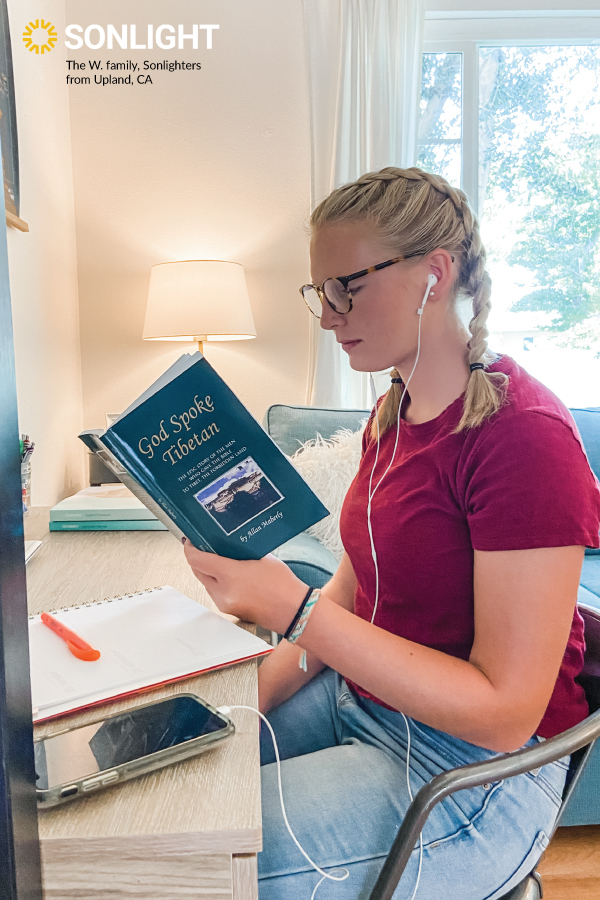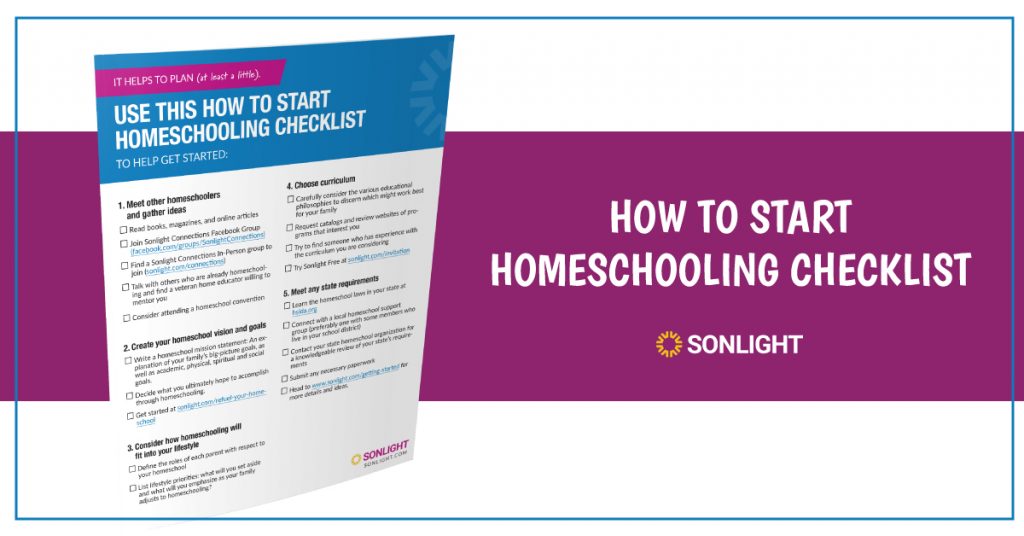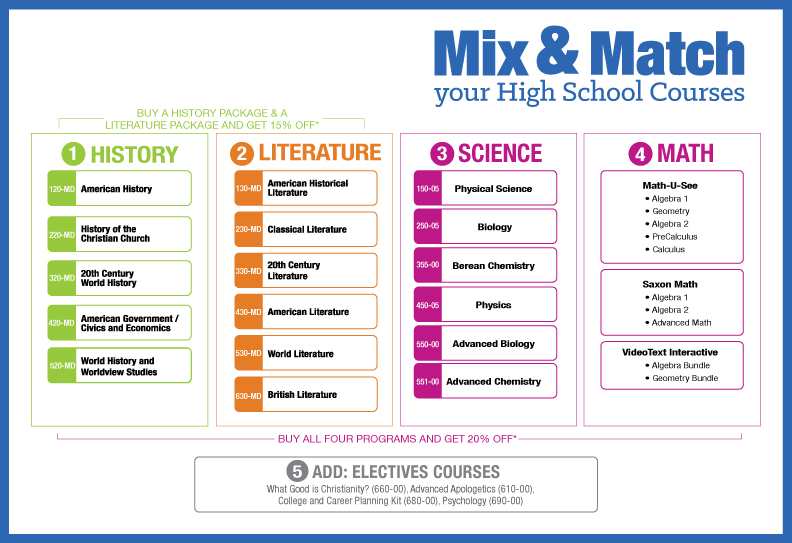Are you wondering if now is the right time to homeschool your high schooler? Do you want to be sure you are able to cover all of the homeschool requirements for high school? Whether you are a first-time homeschooler, or a pro with a middle schooler approaching high school for the first time, this post will cover what you need to know to successfully begin homeschooling in high school.
Ava C., age 18, of Whitewright, TX
Ava has homeschooled since Kindergarten using Sonlight for 10 of 13 years.
"When planning for her senior portrait session, Ava knew she wanted a shot with a few favorite books. Here is a view of how we have seen her for much of her life….behind a good book! Sonlight has nourished Ava’s enormous hunger for books, and it has been the best investment we have made in her education so far." — Ava's mom
How Do I Homeschool My High Schooler?
Many high school curriculums are written to be self-directed. These put your teen in the driver's seat for the first time. Much like driving, it’s wise to stay close and give plenty of directions. As the leader of your homeschool, you will teach your high school student how to study intensively, manage their time, and plan their schedule to be a successful student. So where do you begin?
Find State Requirements for Homeschooling
Legal compliance is a must to protect your family and the homeschooling community at large. Thirty years ago in Iowa, parents were threatened with jail time for choosing to homeschool their children. Several families challenged the laws and fought to reclaim their rights to homeschool. The conviction of families like these and the continuing work of many other men, women, and homeschool-friendly legislators maintain our freedom to homeschool in all fifty states.
To find your homeschool laws by state, search the Homeschool Legal Defense Association (HSLDA) website. HSLDA offers detailed descriptions of state laws, supportive videos, and documents with links to help you fulfill the requirements. When you choose to homeschool, you will submit any necessary paperwork to your local school district if it is required.
Are you still unsure if homeschooling is the right fit for your family? See more on the pros and cons of homeschooling in this free digital guide—our gift to you.
Define Your Student’s Academic Needs
The first year of homeschooling is a great time to make corrections in areas of weakness. If your student is coming from public school, you will have a history of grades to help you determine where they might need more teaching support.
Create an Outline of Daily Requirements
To know what courses to plan for the full four years of high school you will need to know what subjects your student is required to cover. By knowing their academic goals, grade placement and interests, and the courses required in high school, you will have the components you need to create a complete transcript for your student.
You can compare a few local high school graduation requirements. I had better results by checking college websites for their incoming freshman requirements. If you are unsure about which college or if your child will attend college at all, don't worry. The colleges we looked at varied little. See more on this process at How to Create a Four-year High School Plan for Homeschool. With a good snapshot of the minimum requirements, we were able to build out a plan for the next four years of high school, adding electives that were meaningful to my teens.
How Much Does It Cost to Homeschool a High Schooler?
The average homeschooling family spends between $700 and $1,800 per year. Since high school materials are typically more expensive than elementary ones, expect to spend on the upper side of that range.
While some families brag about homeschooling for free, a DIY education for your teen has hidden costs in terms of the time you’ll spend cobbling together resources and possibly a more fragmented and less rigorous education.
There are ways to reduce the purchase of physical books and materials while still offering a high-quality experience:
- Use free educational resources like DNR, library programs, and college extension classes
- Take advantage of a season pass to a science center or museum that offers free classes for teens
- Join a co-op where members teach a few classes each week
Ways to Stretch Your Homeschool Budget
When we first started using Sonlight, it was a financial stretch for us. We were a young family with seven little kids, a mortgage, and a new business. But because it was the curriculum we knew would meet our goals, we found ways to save on other expenses so we could afford it.
Teaching Multiple Students to Save Money
One of the biggest reasons I chose a literature-based curriculum for high school was that students from several grades can share books. Multiple students using the same curriculum means savings. I have been fortunate to use the same curriculum from Sonlight three times with different students, making my original purchase price a real bargain.


How Do You Homeschool As a Beginner?
Homeschooling is a journey of learning—for you and for your children. Starting to homeschool is about making a choice. That choice is different for everyone. But it’s important to know your homeschool why.
Don’t let your education or position in life keep you from your goals. I was a dismal failure in the public schooling system as a student. There is not a better example of how you can overcome your educational deficits than me, a high school failure. If I can get three kids graduated (and into college) in one year with seven little ones running around, I guarantee you’ve got this!
I was not the best or most cooperative student. My past as a poor student has never hindered my success as a homeschool mom. Instead, I have homeschooled like I wish I had been taught, and we all love it.
Before you start this year, write yourself a note about why you are homeschooling. Put it in the front of your teaching binder and don’t forget to read it, especially on hard teaching days. Read it when negative voices say you can’t.
I’ve been reading my homeschool why page for seventeen years, and every time I do, it’s chiropractic for my homeschooling spine.
Begin with the Basics
You don’t need a lot to homeschool. Although I love to look at Pinterest school rooms and window-shop for teaching tools, we are a pretty basic family. For many of our homeschool years, we had little disposable income, so every homeschool purchase had to work for us!
Basic Homeschool Supply List
- Tote or half crate
- Pencil case
- About a million pencils (hide half for next month)
- High-quality colored pencils
- Notebooks
- Working folder for each student
- Designated turn-in box
- Great big book bag
Necessary Supplies at the High School Level
- Up-to-date computer
- Noise-canceling headphones (if working with siblings)
- Personal planner
- Curriculum that supports your 4-year plan
Work Into a Full High School Day
When you begin homeschooling, start smaller than you think. If things go really well, add more to your day. This is what I still do at the start of every school year even though we have been homeschooling for nearly twenty years.
Each year we begin with our core high school subjects: math, reading, language arts, science, and history. Before we add electives, world language, or other non-core classes, we nail down our school day routine. My goal is to be fully up and running in a few weeks. This incremental pace helps us build up to a full schedule without getting behind.
Sarita from Sonlight says, in regard to transitioning from public school to homeschool, “Consider planning some memory-making fun the first week to celebrate the change to homeschooling and share with your kids a positive vibe. Go to the zoo in the middle of the day, or eat donuts in your pajamas. Let it sink in that you can do that now!”
How Does Homeschooling in High School Work?
Unlike middle school where you are the leader, homeschooling for high school is about helping your teen take the lead in their education. These years are preparing your students for life, college, and the workforce. The more leadership and responsibility they master in high school, the less they need to learn through trial and error in life.
There are two key areas of struggle in the transition from middle school to high school.
1. The Transition to Independence
The best high school homeschool programs have a schedule for the student to control and follow. For example, Sonlight offers a Student Guide and a Parent Guide at the high school levels so teens can be accountable for their own work (including grading and transcripts). With their own high school schedule to follow, the excuses are gone. They are responsible for their daily production. This is life as they will experience it as adults.
There is a greater benefit though. Because they have the whole schedule in front of them, they will begin planning their calendar and learning time management. For example, my kids have learned to delegate their assignments around their desired activities. If they want to go on a trip with Grandma, they know how to work ahead to be sure they are free.
2. Motivating the Reluctant Student
If this is your first year homeschooling or if you are experiencing a season where getting work done is more difficult than it has been before, you may need to make some changes to how you homeschool. It’s okay to scrap your schedule if it no longer fits your high school student. The workload at the high school level is completely different. You have to learn how to navigate high school with your reluctant learner in the lead while boosting motivation. That means new tools to support learning. I have used a number of tactics to help support my high school learners.
Non-Academic Way to Support Your Learner
- Tackle difficult subjects early in the day
- Provide good nourishing foods
- Use charts and lists to keep students on task
- Get outside
- Talk about caring for mental health needs
- Make your relationship a priority
What Is the Best Homeschool Program for High School?
The best homeschool program for high school is the one that meets your family's needs, one that helps you accomplish your academic and spiritual goals as a family.
Before you choose a high school curriculum; you need to know what goals you want to accomplish. Asking, “What English curriculum should I use?’ is a very different question from asking, “What is a good English program for a high school student who needs a review of the basics before graduation?”
The closer you can get to the right question, the closer you are to getting the BEST program for your student. Get out a piece of paper and write down all you would like to accomplish this year in various subjects. Circle your top three or four highest priority items. Now formulate a question with these goals in mind. These will help you determine the best high school program to meet your specific homeschooling goals.
If teaching your high schooler to think critically, to write well, and to comprehend science are primary goals for you, Sonlight is an excellent choice. It’s literature-based approach (no traditional textbooks) means that learning is not dull but fascinating.
Ask the Sonlight Advisors for help in choosing a program that fits your high schooler. Then make use of Placement Tests to find the best curriculum fit for a skill-based subject like math.
Is Homeschool Good for High School?
Study after study has shown that homeschooled teens are well prepared for the future, not only in academics, but also socially. Among this body of research is the study, Home Educated and Now Adults, by Dr. Brian Ray. His survey of 5,254 adults, ages 18 through 24, found that homeschoolers are more involved in civics, community building, and higher education than their peers.
More telling is that 95% of those adult homeschool graduates responded to the survey that they were glad they were homeschooled. 92% felt that homeschooling gave them advantages in adulthood, and 82% agreed that they would homeschool their own children.
You can read the full report commissioned by Homeschool Legal Defense. The results of the survey indicate that homeschooling not only produces successful adults, but ones who are an asset to their communities and value education for themselves and their children.
Colleges Love Homeschoolers
Three of my own homeschool graduates were given multiple scholarships, both academic and athletic. The evidence is far from anecdotal. According to the study by Dr. Brian Ray, over 74% of home-educated adults ages 18–24 have taken college-level courses, compared to 46% of the general United States population. Nearly half (49%) of the respondents in the study were still full-time students and many had not yet received their degrees, so this number could actually be higher than reported. So why do colleges love homeschoolers?
Homeschool Graduates...
- are self-disciplined
- are familiar with self-directed projects
- have independent study skills
- know how to respond to deadlines
- have advanced writing skills
- are effective researchers
- are collaborative learners
- develop and balance extracurricular interests
- tend to occupy leadership roles on campus



What is Homeschooling Like for High Schoolers?
While attending the Homeschool Iowa 2021 Conference, I had a chance to interview quite a few teens between workshops. I asked them, “How do teens take the lead in their homeschool experience?”
High School Credit for Current Interests and Activities
Almost every teen I interviewed offered several topics of study or areas of interest that they had contributed to their homeschool workload. Several chose to learn an instrument, one joined the local high school band and drama club. Several chose what world language they wanted to study.
As each student spoke in their interview, they were excited to tell me about what they were learning. When was the last time you talked to a high schooler who was passionate about what they were learning in school? Every one of these kids has something they wanted to share with me.
These kids aren’t learning only to earn a credit or a letter grade. Their learning is desire-driven —giving our teens skills for life. I recognized this difference at our son’s Senior Night. A homeschool education provides a wealth of rewards far beyond ribbons and mementos handed out during an awards banquet.
Homeschooling gave the teens I interviewed a meaningful way to incorporate their extracurricular interests into their transcript and earn high school credit for them. One student chose to study Latin as a freshman and thus discovered she had an interest in learning languages. She now intends to attend college to study linguistics and translation.
Homeschooling gives students time to explore topics and to pursue their interests to a fuller capacity. This is why many high level professional musicians and athletes have transitioned to homeschooling at some point in their careers. With homeschooling, education does not have to be sacrificed for training. With increased training hours, homeschooling creates a way for parents to stay central and maintain a home-life balance.
What Grade Should a 16-Year-Old Be In?
As with all homeschool students, your sixteen year old should be in the grade that best serves them academically. Their learning level can be found by taking placement tests or using outside testing services if you are unsure.
In the homeschooling environment, your student can work above and below grade level in individual subjects as they gain mastery. As a homeschool advocate and coach, I have had the pleasure of celebrating with parents of a twenty-one-year-old student who had overcome great learning struggles to earn his diploma and have also helped advanced learners dual-enroll for college classes and even full time college before they were old enough for their driver's license.
Taking Control of Your Student’s High School Success is Possible
By determining that you are ready to take on the role of homeschool leader in your home, you have taken the greatest step. The rest is a matter of compliance with local laws and determining what your student needs to achieve over the next four years both in terms of earning credits to graduate and in personal goals for character and spiritual development.
Homeschooling has proven to be a great choice for high school students. Graduates have careers in every field and report higher satisfaction with their jobs, are involved in their communities and attend and graduate college in higher numbers than their peers.
The greatest gift of homeschooling is the fact that you get to be central in your teen’s life, building a relationship that will last throughout their lifetime.
There has never been a time in history with more support, tools and options to meet the needs of every type of student. Whether your student is struggling in school or needs the freedom to grow beyond grade level, homeschooling allows you to personalize each subject to their needs.
Making the choice to homeschool in high school means the ability to build a custom education for your high school student where both of you are working together to prepare for their future.













I have homeschooled my children and blog like these have always helped me. Keep sharing such great blogs.
Great read!!! Thanks for sharing such a great blog.